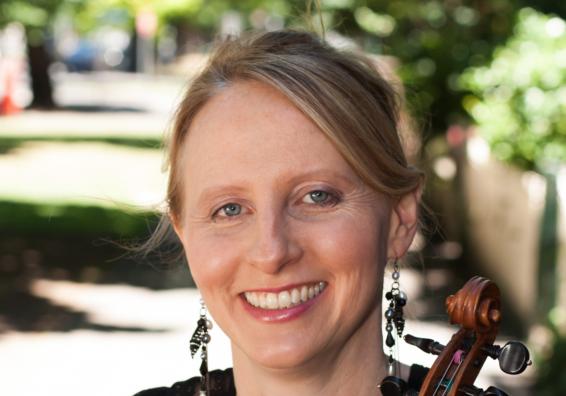MCO’s Rococo Cello can be heard in Melbourne on Thursday 02 March at The Deakin Edge, Federation Square & Sunday 05 March at Melbourne Recital Centre.
Rachael Beesley is one of the violinists who will be joining us to bring you Rococo Cello. As a guest concertmaster and director with many European and Australian orchestras, Rachael has performed on over fifty CD recordings and made numerous festival, radio and television appearances. She also teaches and presents university lectures across the world, from the Melbourne and Sydney Conservatories in Australia, to the Royal Conservatoire in The Hague, Netherlands, specialising in Historically Informed Performance Practice specialist and Flow. Since 2011, she has also been listed in Who’s Who of Australian Women. We caught up with her to speak about Rococo Cello and her fascinating life as a professional musician.
MCO: What is your role in Rococo Cello?
Rachael: As principal second violin, I have a central role in the Rococo Cello program as leader of the engine room of the orchestra! For this concert, the second violins are responsible for the strong rhythmic and harmonic progressions that help create the music’s energy and drive. As leader of this section, it’s a balance between supporting and emulating the first violins, and encouraging one’s section to become at one with the orchestra and with the soloist’s sound and interpretation. Performing on stage with a soloist of such calibre as the world-renowned cellist Li-Wei Qin brings a special intensity to the experience.
MCO: Tell us a bit about your life as a musician. I hear you travel quite a bit!
Rachael: It’s a crazy life for sure, performing and teaching music in the northern and southern hemispheres, but one that brings true fulfilment and joy along with its challenges. Last year I travelled to Europe five times to direct and lead orchestras for concerts and recordings, as well as to teach at the Royal Conservatoire in The Hague. Meanwhile I continue my career in Australia, where I am devoted to creating new education and performance opportunities for Australian musicians.
MCO: How does life as a professional musician differ between Europe and Australia?
Rachael: There is a pleasure to working in both music scenes. The closeness of all the European cities creates greater opportunities to work in many different countries and to perform the same program a number of times on tour, while the influence of language, culture and history also plays a major role. In Australia, however, there is actually the exciting opportunity to bring a freshness and new identity to the repertoire. Here you can be part of a flourishing scene that encourages a great deal of entrepreneurial spirit and energy.
MCO: What are some of the projects you are involved in this month?
Rachael: Ludovico’s Band is celebrating the 450th anniversary of Monteverdi this year and our first concert for the season is on Tuesday March 7th at 6pm in the Salon, Melbourne Recital Centre. It’s called Love & War and features works by Castello and Uccellini that were inspired by Monteverdi, as well as favourite madrigals by the master himself.
The element of song continues with a wonderful program of Sibelius, Respighi and Purcell, sung by mezzo-soprano Sally-Anne Russell and accompanied by Quartz quartet. Included in this program, The Sunset at the Salon, Melbourne Recital Centre, Tuesday March 14th at 6pm, is Grieg’s dramatic and entrancing string quartet.
And on Friday 24th March at 7:30pm, we’re very excited to be bringing the Australian Romantic & Classical Orchestra to Melbourne. Established three years ago together with Richard Gill AO and my co-founders, ARCO is thrilled to be presenting our first subscription series at the Melbourne Recital Centre this year. I’ll be performing as concertmaster/director and soloist in this lusciously Romantic program of Beethoven, Wolf and Mendelssohn.
MCO: You’ve been involved in “historically informed performance practice”. What does this mean to you and do you think this is changing?
Rachael: The Early Music movement (or Historically Informed Performance (HIP)) scene has been gaining traction over the last few decades. Most recently, it has expanded the repertoire range to include 19th and early 20th century repertoire, as the performance practices at the time of these compositions still vary greatly from our modern understanding and traditions of performance. My passion for learning has taken me on a journey to expand the possibility of musical interpretation through the use of period instruments. This lets me engage with historical contexts and utilise performance practices of the time, so I can explore repertoire with a greater depth and understanding. In reality, this means I maintain four different setups of violins for a range of repertoire from the 17th to the 21st centuries. However, I can also use this research to inform and inspire my performance of Baroque, Classical and Romantic repertoire when playing on modern instruments.

